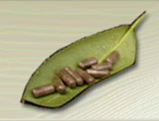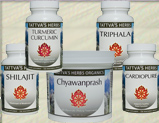Sanskrit name: Tulsi
Botanical name: Ocimum Basilicum
Habitat: Indigenous to India.
Energetics:
- Rasa (taste): pungent
- Virya (action): heating
- Vipaka (post-digestive effect): pungent
- Doshas (constitutions): Balancing for vata and kapha
General information
Tulasi, or Holy Basil is an herbal remedy used that has been used for centuries in traditional Ayurveda. Tulsi is an important constituent of many Ayurvedic cough syrups and expectorants. It helps to maintain healthy mucus levels. Its oil is rich in vitamin C, carotene, calcium and phosphorus.
Reference
- Characteristics of essential oil from basil (Ocimum basilicum L.) grown in Australia. J. Agric. Food Chem. 44: 877-881.
- Van Duong, Nguyen. 1993. Medicinal Plants of Vietnam, Cambodia, and Laos. Masada, Y. 1976. Analysis of Essential Oils by Gas Chromatography and Mass Spectrometry. John Wiley & Sons, Inc., NY.
- De Mena Guarero, M.G. 1994. Obtencion y Aprovechamiento de Extractos Vegetales de la Flora Salvadoreña. Editorial Universitaria, Salvador.
- McCorkle, C.M., E. Mathias, and T.W. Schillhorn van Veen, eds. 1996. Ethnoveterinary Research and Development. Intermediate Technology Pubs., London.
- Takano, T. 1993. Effects of the ratios of K to Ca in the nutrient solution on the growth, nutrient uptake, essential oil content and composition of basil. Acta Hort. #331: 129-135.

 Loading... Please wait...
Loading... Please wait...














